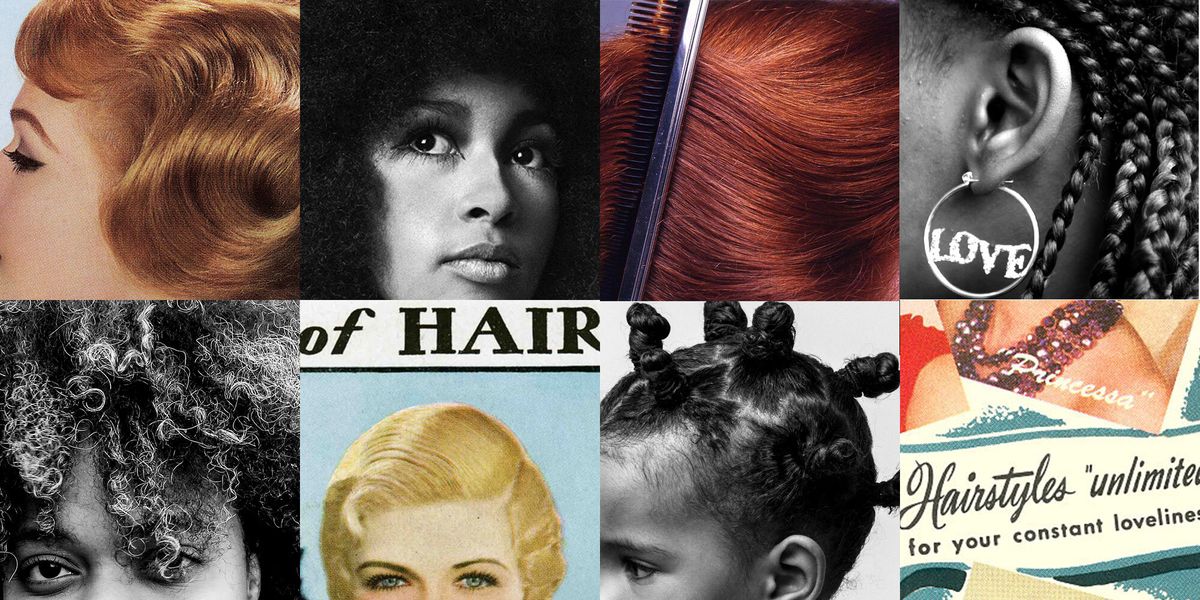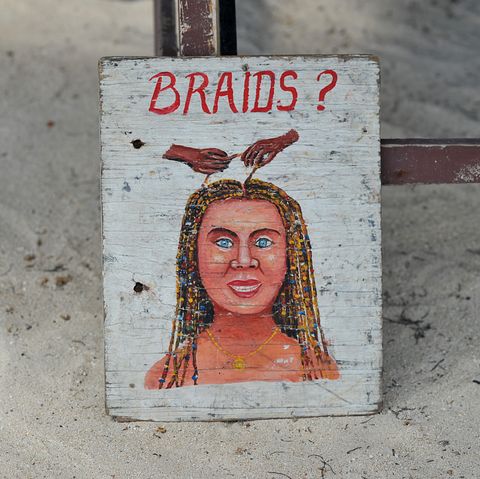My favorite way to start an argument is by saying, “I find it funny how….” followed by whatever transgression has upset me. So, I find it funny how I, as a Black woman, know so much about White hair. I know it gets greasy if it isn’t washed. I know that ‘the Rachel’ didn’t really work out for everybody. And I know if you are going to wear a “Bump It” you need to tease your hair up from the root. However, my White counterparts know about as close to zero as one can get when it comes to Black hair unless it has been popularized by an influencer, celebrity, fashion show or beauty publication. Funny, right?!
A quick Google search of the word “hair” will disproportionately show all-white results. The Google page populates like a Trump rally: not a kink or curl in sight. White women’s hair has dominated the conversation with racially charged terms like silky, smooth and straight; hair ideals not always associated with natural Black hair.
The long lustrous manes you see on TV and in mainstream media are usually in shades of blonde, amber and brunette— rarely with a twist out or an afro featured center stage. White beauty in this space is prioritized even down to how it is maintained. While you’ll see a slow motion hair flip or just-stepped-out-of-the-shower “wet look” in a commercial, it’s rare to find an advertisement that shows a Black woman washing her hair in the same way as a White woman. The White beauty standard is reaffirmed with every shampoo and conditioner scenario, presented as something most women do, but only showing White women doing it.
This content is imported from YouTube. You may be able to find the same content in another format, or you may be able to find more information, at their web site.
My unwanted edification started in high school in the completely devoid-of-diversity suburbs of Connecticut. Connecticut is where I learned some of the greatest hair hits for white women, which included but were not limited to: layers, highlights, balayage, the still-wet-and-left-the-house-hair-to-let-it-air-dry-in-public-look, the classic scrunch moment often done with gel or hair spray to give the illusion of a wave—which if done wrong can end up looking like a crunchy curl—the clip-ins so they can tell you about their ‘weave’ and my absolute personal favorite, the-I-just-went-to-the-Caribbean-with-my-family-and-I-got-these-braids-with-beads-on-the-ends, because “Jamaica, Mon!”
PSA: Cornrows and box braids were not invented at a Sandals resort or wherever you spent your family vacation. Moments like these remove the history of Black hair and hairstyles and place it under the white lens. If you are white and the first time you saw cornrows in person was on vacation, you now associate hair braiding as a part of your tourism experience, and a souvenir you can bring back with a sunburn. These moments which may have harmless intent aid in the erasure of the history and culture behind these hairstyles created by Black people.
The general lack of awareness of White women when it comes to Black hair unlocks a different level of frustration. I remember when I was in my junior year of college and was preparing to study abroad in Seville, Spain. My biggest concern before I left was, “What am I going to do with my hair?” My White college roommate was studying abroad with me and couldn’t understand the level of stress this was causing me. I didn’t have the energy to explain to her that despite how dull her highlights may get or how visible her roots would become, that if she really needed to she would likely be able to find someone to fix her hair, or at the barest of minimums, find someone that would be familiar with the texture of her hair.
I have had countless experiences like this and I have learned that I do not have the time or the tools to explain the nuances of my Black hair without being offended by how much I know about hair that is nothing like my own. Whether it has been by Asking Jeeves or being bombarded by white standards of beauty in my lifetime, it is now clear to me that I have been in AP White Hair, while my white peers had been left back twice in remedial Black Hair 101.
Having spent a lot of time in predominantly white spaces in school and in the workplace I have done some light Google searches on the things being spoken about around me, even if they were as trivial as highlights and lowlights. White people are most comfortable with Black people who make them feel like they are speaking to white people, so the light research feels almost like I am in Duolingo. Knowing this sort of goofy information can unknowingly shift me from being just the “Black girl at work” to “the nice Black girl at work who asked about my keratin.” The necessity of knowing about Black hair has never been made of value because there is no tangible way for white people to benefit from it other than by co-opting it for non-Black hairstyles.
It is unfortunate that there isn’t more widespread knowledge of Black hair given its resilience, strength and versatility. I am biased, but Black hair is beauty and it is power. I think of all of the uniquely Black experiences I have had in my lifetime that are directly related to my hair. Spending countless hours of my life in the hair salon to get my hair pressed, going into the shop expecting to leave looking like Aaliyah and ending up like Shirley Chisholm instead, getting banana curls for church an Easter Sunday, the first time I had to hold down my ear to get ready for a hot comb straight off the stove to get my edges, rifling through the pages of the JET magazines at the beauty shop to find the Black Beauty of the Week, the headache you get after box braids and my first weave. These memories are not ones I have ever expected my non-Black friends to know about, but I am sure if they had some sort of basic understanding of the cultural differences, in the same way I did growing up, I could have probably avoided the following choice comments: “Your hair is so wild,” “You don’t wash your hair every day?!” and the most fun comment of them all, “I like you better with straight hair like mine!”
This disproportionate understanding of hair has now come full circle. I have seen so many people pledging a commitment to educate themselves on Black culture and history as a means of reconciling the fact that they have lived the entirety of their lives not having to do so. I kindly ask that all of the non-Black folk making this commitment not misconstrue this as an opportunity for you to learn about Black hair and then explain to me how much you know about its history. I do not need you to educate me about me. I need you to learn and understand more about me.
This is an opportunity for you to be more culturally aware of microaggressions that you are a part of when you treat my hair like it’s a science project. However, if you would like extra credit, please know I have been quietly and patiently waiting in the wings to release a very niche brand of pop quizzes inspired by my personal experiences and composed of questions that I would consider to be deep cuts on Black hair and the like. Is two bundles ever enough? (No.) Should I cancel all of my plans if I plan on getting waist length box braids on a Saturday? (100%)
The winner gets the invaluable knowledge that raisins will never be a part of a potato salad recipe that is welcome at any cookout and it is not okay under any circumstances whatsoever to put their hands in another person’s hair.
This content is created and maintained by a third party, and imported onto this page to help users provide their email addresses. You may be able to find more information about this and similar content at piano.io

